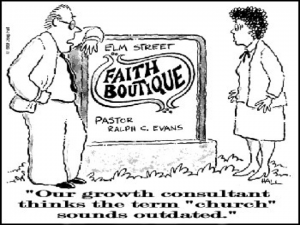 Ghostwriter and contributing editor for Inc. Magazine, Jeff Haden has written a number of articles on how CEO’s and other department Supervisors are to relate to employees and vice-versa. This has provoked thought on faith-based initiatives and how Pastors should relate to those they are attempting to lead. While there are similarities there are many subtleties in applications. The relationship within for-profits corporations is based upon performance – paycheck rewards. In non-profits the relationship is far more communal/relational and not paycheck rewards driven. There are ten things that faith-based leaders should provide for those serving them.
Ghostwriter and contributing editor for Inc. Magazine, Jeff Haden has written a number of articles on how CEO’s and other department Supervisors are to relate to employees and vice-versa. This has provoked thought on faith-based initiatives and how Pastors should relate to those they are attempting to lead. While there are similarities there are many subtleties in applications. The relationship within for-profits corporations is based upon performance – paycheck rewards. In non-profits the relationship is far more communal/relational and not paycheck rewards driven. There are ten things that faith-based leaders should provide for those serving them.
- Ownership
Churches are not manufacturing facilities in that we are producing shapes, colors, and designs. We are shaping people for Eternal Kingdom purposes. Therefore, engagement and satisfaction is based upon ownership. Do your leaders own the vision? Have they bought into you as a leader first? When that happens, leaders will obtain a sense of satisfaction that will be based upon their freedom to be responsible for the outcomes. Autonomy and independence plus freedom breeds’ innovation and dreams.
- Clear Expectations
The old adage is true: If you do not know where you are going, then any road will take you there! The one true litmus test of casting clear vision and expectations is the ability to write it down on paper. If it cannot clearly be communicated in writing, then we are daydreaming. In the book, The Advantage, the author obsesses over the fact that communication must be ridiculously redundant. When in doubt communicate!
- Purposeful Goals
While the corporate world is controlled by the bottom-line, non-profits should be controlled by a higher purpose. The leaders we train need to know their effort serves greater purposes than “branding/marketing” agendas. To leave a footprint in life is a great accomplishment. Legacy building starts today!
- A True Sense of Purpose
The Latin meaning for our word “religion” is ligare’. This implies my effort to link back to a creator or that, which is bigger than myself. Vision needs to be tied to a greater community good. We are not just in the Brand Building business – we are in the Influence Building business. The highways and hedges mentality is worthy of time and resources to implement community-influencing strategies.
- Provide Significant Input
The pathway to exchange ideas should be wide-open, accessible and honored. Pastor honor those who offer suggestions about the work they are involved in. Understand they are thinking about the what and where we are doing and headed. Those ideas that seem to be in left field are great teaching moments to assist those people through a “critical thinking” process, helping hem to evaluate their ideas differently. This is serving them and adding value to them. The absolute last thing you would do is to criticize their idea. They will shut down immediately.
- Connect
Pastor you need to understand that people volunteer for more reasons than being rewarded. They want to follow someone they admire and can trust and in turn know they are admired and trust is reciprocated. Connections are made on a personal basis not just a professional basis. Ask them about their family, children, or hobbies, this will build rapport. Relate to them as human beings and not just workers.
- Consistency
As Pastor, people are looking for consistency in conduct, policy, and behavior. They will take tough-mindedness if it is consistent. The more that workers understand why decisions are made the less likely they will consider they are being treated unfairly or assume favoritism.
- Private Criticism
No one is perfect – no even pastors! We all need constructive criticism, not public rebuke. Good feedback is always done privately and with dignity. Always have in mind the other person’s growth and influence capability; this will keep personal attacks to a minimum.
- Public Praise
Everyone does something that is praise-worthy from time to time. Show appreciation and recognition. Catch people in the act of kindness. The “Five-Minute Manager” book that came out years ago suggested that five minutes be taken to start each day to either call, email, or send a personal note of thanks and appreciation for a job well done. Small acts of appreciation pay large dividends.
10. Preferred Future
Every area of work within life should have an opportunity of advancement. Pastor, develop the people around you. You cannot influence a community if you cannot influence your closest workers and allies. Invest in other people’s success. Resource them and give opportunities for learning. Don’t go to seminars by yourself; take others with you on the learning journey.
Share ONE COMMENT when a leader impacted your life in a positive way. Also sign up and receive a copy of the 20 Great Questions That Demand An Answer.












